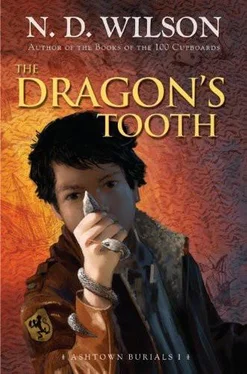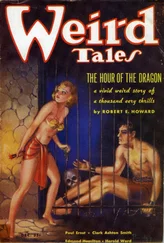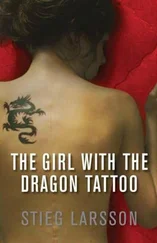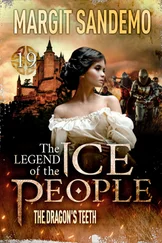“I feel that way about … everything.” Antigone sighed and looked up, almost smiling. “Maybe tomorrow we’ll find out that we’re still four and five years old, I’m still taller than you, and everything around here has just been a very complicated daydream. Mom’s fine, Dad’s alive, we never moved, and Dan still knows how to smile.”
Cyrus breathed slowly. Half a continent away, he could almost hear the ocean. “No waffles,” he said. “No motel.” He grinned. “But I was already taller than you when I was four.”
Antigone spun her brother around, put both hands on his back, and pushed him toward the door. “Go,” she said. “Movie when you’re clean.”
The door closed, and she was alone with a whirring projector.
Outside, Cyrus looked up at the night sky. The clouds had blown over, and the stars of early summer had crowded silently into place above the Golden Lady.
The yellow truck sat where he’d parked it, immediately in front of the two adjacent doors—110 and 111. Both rooms had curtains drawn over the windows, but both rooms still glowed. Dan’s room was out of sight, by reception, opening on the courtyard. And no light trickled down through the walkway from Mrs. Eldridge’s room. She had checked out two hours ago, showering Dan with a barrage of shouted warnings before dragging a single suitcase toward the road.
Cyrus took a long breath of the cool night and stepped over to his bedroom door. For a moment, he listened to the neon buzzing of the Lady, and then he knocked.
On impulse, he raised his thumb and covered the peephole. A mosquito drifted past his ear and settled on his extended arm. He slapped at it and waited. A few slow seconds ticked by, and he knocked again.
Muffled footsteps approached. A dead bolt slid. A chain rattled.
The door opened, and William Skelton, smoking, leaned against the frame.
Cyrus took a step backward. The man was wearing jeans and a tight, stained tank top. His face was pale and sickly, but his bare shoulders and arms could have belonged to a thirty-year-old lumberjack, a lumberjack with a taste for morbid tattoos. The man’s skeleton had been crudely needle-etched onto every visible part of his body from the neck down. Scrawled collarbones stood out above a cage of blue ribs. Ink bones marched down his shoulders and arms. Even the backs of his hands and the tops of his bare feet were detailed with every joint and knuckle. Slanted notes and calligraphics filled in the remaining space on his arms and shoulders.
Cyrus couldn’t help but trace every bit of ink with his eyes. He’d never seen anything like it. Fear was trying to crawl up his spine. He pushed it away. It was ink. Nothing but ink. Looking up into Skelton’s sweating face, Cyrus dug into his pocket and pulled out the ring. “I brought back your keys. You know you can’t smoke in here.”
William Skelton turned and walked back to Cyrus’s bed.
“Hey.” Jingling the keys, Cyrus stepped into the doorway. His room had been destroyed. His shelves and their collections had been torn down off one wall and piled on the floor. The wall itself had been ripped open from end to end, revealing a row of hollow cavities and cast-iron plumbing. On the side of the bed, a small but bellied man was sitting with his legs primly crossed. He was wearing a gray suit, and half-moon glasses were perched on the end of his nose. Large sheets of yellowing paper were mounded around him.
“What?” Cyrus scanned the carnage of his room, his life. “You trashed my room.” Fear was gone. He could feel his pulse in his fingertips as his mind scrambled for some kind of explanation. “You know what?” He kicked a shard of drywall at Skelton’s legs. “I’m keeping your keys, old man. They’re going to disappear. All of them.”
The small, fat man clicked his tongue and cocked his head. “This is the boy?” he asked Skelton. “This is the best you could do?”
William Skelton nodded and pulled at his cigarette. He had chewed the end almost flat.
Cyrus glared at the man in the suit. “Who are you? Did you rip into my wall?”
Peering over his glasses, the little man examined Cyrus’s shorts, his shirt, and finally his face.
“I was getting some clean clothes,” Cyrus said. “It’s been a long day. Why did you wreck my room?”
“You’re sure about this, Billy?” the small man asked.
“About what?” Cyrus asked. The room was chilly with air-conditioning, but William Skelton wiped sweat from his forehead onto the back of his tattooed arm.
“Kid,” he said quietly. “How do you feel about Death?”
“What?” Cyrus took a small step back.
“Death,” Skelton said again. “Dying. How do you feel about it?”
“How do you think I feel about it?” Cyrus asked. “Death sucks. I don’t like it. How do you feel about it?”
The old man stared at the end of his cigarette. “People say you can’t run from Death.” He shook his head. “People lie. Running’s all you can do, kid. Run like Hell’s on your heels, because it is. And if you’re still running, well, then you’re still alive.”
Cyrus opened his mouth, but he had nothing to say. The little man was sorting through his wrinkled stacks of paper.
Skelton examined his tattooed hands. They were trembling, but his voice was calm. “You know what happens when you run too long?” He made a fist and looked into Cyrus’s eyes. “Death becomes … a friend, a companion on the road, a destination. Home. Your own bed. The place where your friends are waiting. You stop being afraid. You stop running.” He dropped the stub of his cigarette onto Cyrus’s carpet. “Tonight,” he said, grinding the butt out with his bare foot, “I stop running. Someone else is gonna start.”
Cyrus blinked. Sweat dripped off the man’s nose. His pale face was blotchy, like old dough. “You still look afraid,” Cyrus said. “Your hands are shaking. What’s going on?”
Skelton looked over at his small friend.
“A touch of spunk,” the man said, nodding. “But only a touch. His odds are still terribly low.”
“What does he have to sign?” Skelton asked.
“Him? Nothing.” The small man raised a small selection of the papers. “You’ve signed the appointment already, and I’ve found the paperwork to demonstrate that you have the necessary relationship to do so, though leaving it with me in the first place would have been wiser than hiding all of this in the walls. I can supply the Order notary and testimony of fitness and volition. As a Keeper, I can witness the declaration.” He reached into his breast pocket and pulled out a small, heavily creased paper card. Unfolding it, he extended it to Cyrus. “Read that aloud, please.”
Cyrus looked down at the slip, and then back up at the strange scene in his room. “What’s going on? Those papers were in my wall?”
“It was my wall first,” Skelton said. “I gave this place to your parents years ago.”
“Just read it,” said the little man. “They haven’t enforced the original oath in generations, but I’d like to cross all the i ’s and dot all the t ’s in this situation.”
“It’s the other way around,” Cyrus said.
“We’ll cross and dot both. Read it, please.”
“No thanks,” said Cyrus, backing toward the door. “I’m gonna go now.” He tossed Skelton’s keys onto the bed and felt for the doorknob behind him. “See ya.”
The keys smacked into Cyrus’s chest; Cyrus caught them at his waist. Skelton smiled and shook his head. “Those keys should have been your father’s. It doesn’t right old wrongs, but they’re your burden now, Cyrus Smith. The race is yours. The world is yours. Run until Death’s your friend, and then set those keys in another’s hand. Not before then, hear me? Once you give them, you can’t get them back. And not a soul should know that I’m setting them in yours. I’ve got more to give, but that’s a start.”
Читать дальше












